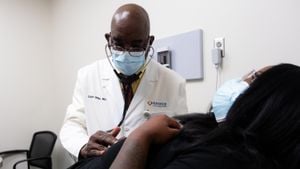A bold new chapter in space exploration has been written as SpaceX's Polaris Dawn mission takes center stage, aiming to achieve the first private spacewalk. Launched from the Kennedy Space Center early on September 10, 2024, this groundbreaking mission is led by American tech entrepreneur Jared Isaacman, who has not only financed this ambitious endeavor but is also a trained astronaut ready to soar higher than any civilian has before. Unlike previous space tourism trips, Polaris Dawn is about pushing the boundaries of commercial space travel, venturing beyond the International Space Station's orbit.
This mission aims to set records. It plans to reach altitudes of 870 miles (1,400 kilometers), far surpassing the previous limits set during NASA’s Apollo missions. Along with Isaacman, the crew comprises SpaceX engineers Sarah Gillis and Anna Menon, as well as retired Air Force Lieutenant Colonel Scott “Kidd” Poteet. The mission is marked by aspirations not only to conduct the first-ever commercial spacewalk but also to test new technology, including upgraded spacesuits and inter-satellite laser communications with SpaceX’s Starlink satellites.
Isaacman, who previously made headlines for leading the all-civilian Inspiration4 mission—which raised significant funds for St. Jude Children's Research Hospital—has now partnered with SpaceX to carry the Polaris Dawn mission forward. This partnership involves the substantial investment associated with developing the new spacesuits necessary for the mission, which are being put to the test during this flight.
While spacewalks have long been the domain of professional astronauts, Isaacman’s team is determined to navigate this uncharted territory, which has historically required careful training and precision to perform safely. The plan outlines for Gillis and Isaacman two brief extravehicular excursions, where they'll maintain physical contact with the capsule at all times to minimize risk—no hopping around or showboaty antics allowed.
Upon successfully lifting off, the crew engaged with mission control including Launch Director Frank Messina, who encouraged the astronauts, saying, “We’re sending you hugs from the ground,” to which Isaacman replied appreciatively, noting their shared accomplishment as part of the broader space exploration community. This mission is expected to last five days, with the spacewalk planned for midway through.
Interestingly, this mission stands out not only for its unprecedented private spacewalk but also for its scientific undertakings. The crew will be conducting around 40 experiments during their flight, which marks another step toward making space more accessible for future scientific investigations and commercial enterprises. Notably, this mission isn’t merely about exploration but also about advancing technologies for both communication and human health—two fundamental aspects for the future of human spaceflight.
The Polaris Dawn mission is the first of three expeditions Isaacman has secured with SpaceX, and it's built on the experience and encouraging outcomes from previous SpaceX flights. After successful training sessions, the crew is more than ready to take on the unique challenges this mission presents. The rigorous preparation includes over 2,000 hours of simulator training, ensuring the pilots and mission specialists are well-equipped to handle various scenarios they might encounter during their historic venture.
When discussing the mission's aspirations of reaching new frontiers, Gerstenmaier—SpaceX’s Vice President of Build and Flight Reliability—has emphasized the importance of collaboration with the private sector to push limits. He stated, “We’re really starting to push the frontiers with the private sector,” highlighting the significant shift toward commercial entities taking active roles in space exploration.
While there is excitement, experts recognize the inherent risks associated with spacewalks. This activity is fraught with dangers, particularly considering the mission will be employing components and equipment never before used in actual space conditions. Gerstenmaier himself called it a “risky adventure,” reminding everyone of the necessary precautions, protocols, and extensive testing already completed by the team to prepare for this ambitious endeavor.
Isaacman has expressed his dedication to future generations through his pursuits: “I’d certainly like my kids to see humans walking on the moon and Mars, and venturing out and exploring our solar system.” This personal commitment reflects the broader vision many have for human presence beyond Earth—a tantalizing prospect no longer confined to the realms of fiction.
Polaris Dawn not only aims to be a milestone for commercial space travel but also serves as inspiration for future endeavors—potential missions to places like the moon, Mars, or beyond, all achievable through collaborations between private enterprises and government space agencies.
Weather-related delays have pushed the mission to this point, showcasing how variable conditions can impact even the most planned and prepared missions. The team waited and planned intensely for this perfect window allowing them to circumvent limited supplies and the inability to dock at the International Space Station should other emergencies arise.
While some critics question the viability of private ventures like Polaris Dawn, there is growing recognition of the significant role private astronauts and companies are beginning to play alongside traditional national agencies. The strides made by Isaacman and his team are emblematic of the evolution within the space community toward inclusivity, innovation, and collaboration.
The spirit of exploration remains alive as Polaris Dawn embarks on this remarkable adventure. Every aspect—from the careful preparation and training to the expected milestones—creates ripples in the future of human space flight, emphasizing the readiness for humanity to reach out to the stars and explore the cosmos.



